Peaky Blinders' Amber Anderson tells Janet Christie why playing Diana Mitford took her to the dark side
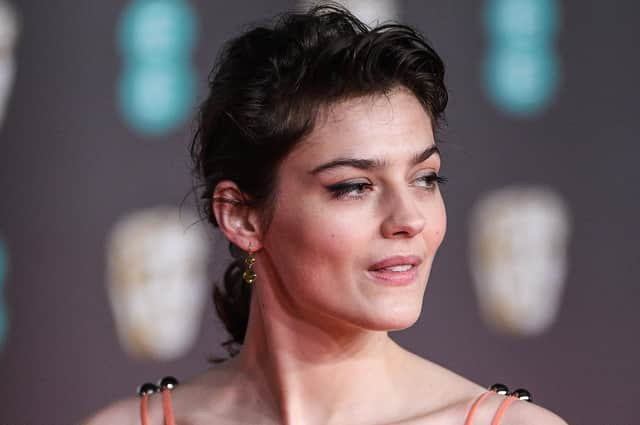

“Provocative, challenging, shocking and disruptive in so many ways.”
Amber Anderson is talking about Diana Mitford, the real life British socialite and fascist who she portrays in the latest, long-awaited season six of Peaky Blinders, currently slashing records on our TV screens with a 4.1 million audience for the opening episode.
“I've never played a character who really didn't care what people thought of her and wasn't afraid to say whatever she liked,” she says.
A fitting nemesis for Tommy Shelby, the controversial, power hungry Diana, engaged to British Fascist party leader Oswald Mosley (Sam Claflin), is almost universally disliked and feared, someone who says and does exactly what she pleases. For Anderson it’s a chance to wave goodbye to good girl roles and go dark and destructive.
Anderson comes on the phone from her home in London, preparing for a well-earned holiday in South Africa after a busy time with the release of Peaky Blinders. A big fan of the show, the 30-year old jumped at the chance to play Mitford as the Shelbys world of crime and politics collide.
“It was very exciting obviously but I was nervous because everyone knew each other. You're walking into it feeling like an outsider, but everyone was so welcoming and professional. I think it's normal to have nerves on your first day. You’d be weird if you didn’t. But after that, I felt good, made some great friends and really enjoyed it.”
Raised near Forres in Moray, Anderson was born in Somerset andt moved north when she was six. After attending the Moray Steiner School, she went to Aberdeen City Music School (she’s a classically trained pianist), but having been scouted as a model when she was 15, embarked on a successful career in modelling (Burberry, Dior, Chanel) alongside acting.
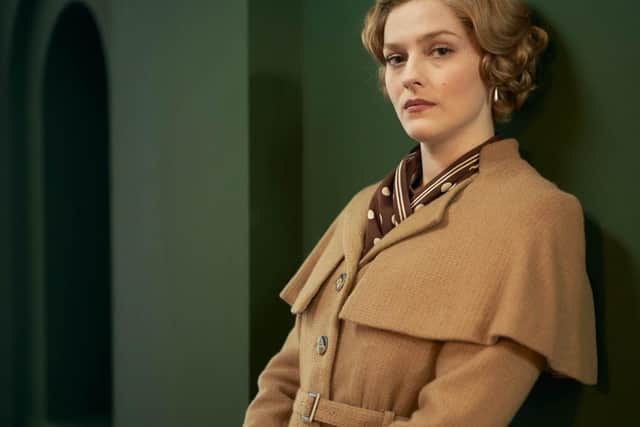

Notable film and TV roles include Emma, the BBC drama Strike - an adaptation of JK Rowling’s The Cuckoo’s Calling where the self-confessed Harry Potter fan was delighted to meet the writer - The Riot Club and Black Mirror. Recently, with her star increasingly on the rise, she won a best supporting actress award for her role in 2019 indie hit film White Lie, and this year can be seen in the critically- acclaimed BIFA award-winning The Souvenir: Part II alongside Tilda Swinton and Honor Swinton Byrne.
Anderson already had a friend on set in Anna Taylor Joy, who she worked with on Emma. “We keep saying we need to do something where we play people who like each other because we do in real life but we’ve played roles where we’re at odds.”
Not surprising really, as Diana is at odds with everyone, even Oswald Mosely.
“I think there's almost a power struggle going on, but in other ways they’re a real double act with the same goal.
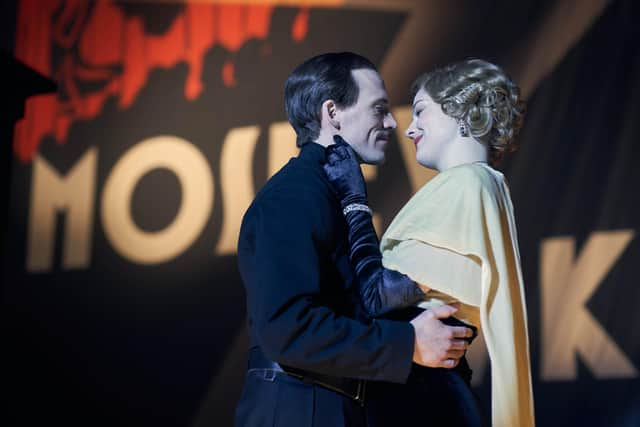

“Also, I thought it would be fun to try and get in a little bit of Diana really running things behind the scenes with Oswald sometimes being a bit of a drama queen and Diana having to say ‘don't worry darling it’s fine, I’ll sort it out’.”
There’s nothing new in women running things, either in front of or behind the scenes in Peaky with a strong cast of women, including much missed matriarch Polly Gray (the late Helen McCrory), Ada, Grace, Lizzie and Captain Swing to the fore.
“I think one of Peaky’s real strengths is its big female roles,” says Anderson, “and I think it needs it in order to counterbalance the darkness and violence. I think it's reflective of the truth since it is a matriarch who's kind of driving everything, so you need the Ada Shelbys and the Polly Grays to make it feel real and balanced.
“And Diana came from a family where it was almost all women; one brother and six girls. They grew up in a time when women didn't have many rights and freedoms but their own little universe would have been completely run by women and that's what she would have grown up feeling, believing and owning. So it's not a stretch to imagine she would have felt she was the boss of things.”
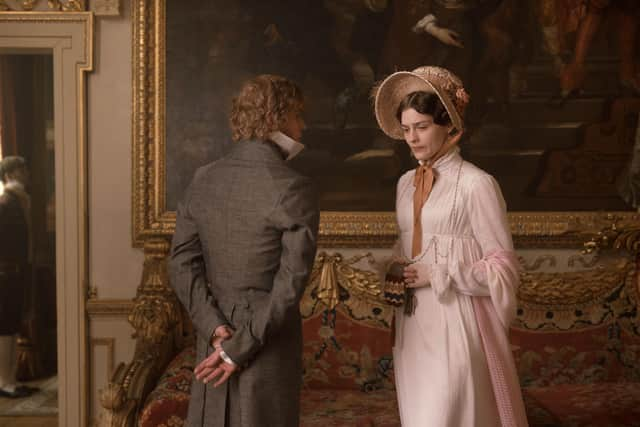

If Peaky Blinders is Tommy Shelby’s story, Diana’s purpose is to shake things up and give him a run for his mob money and power.
“I think she really tests him,” says Anderson, “and I'm saying this with caution, but almost more than any other character in this series so far, because she's coming from a very different place where it's not the way he's used to operating. It's not violence, it's not force, it's not even coercion. She has this ability to say the most abominable and acidic things but in an extremely calm way. I think those people can be more dangerous and scary than the ones who are outwardly violent. That's what will challenge him the most because he's dealing with a different kind of dynamic than he's used to.”
“I think Diana really grows through the series. She starts as someone extremely irritating, patronizing and provocative, but later you begin to see this real darkness to her, and a lack of self-consciousness, which is interesting and alarming.”
To play one of the few real life characters in the series, Anderson immersed herself in researching, reading biographies and autobiographies by the sisters, their letters, and watching film about the Mitfords and Britain between the two world wars.
“I studied a lot of videos of Diana speaking and she had a way of making everything sound as if it was terribly reasonable and completely fine and everybody else was just being a little bit over reactive. I also stole little things from videos I’d seen of movie stars, how they held themselves and how they sat.”
“The Mitfords were an interesting family because they were effectively homeschooled and I think that created a world in which they just ran riot, completely free to do whatever they wanted. That created an environment where you end up with two sisters who are fascists, one who was a communist and one a socialist. They were free to read any book in their dad's library and I think that set a very interesting scene in terms of who they were to become.”
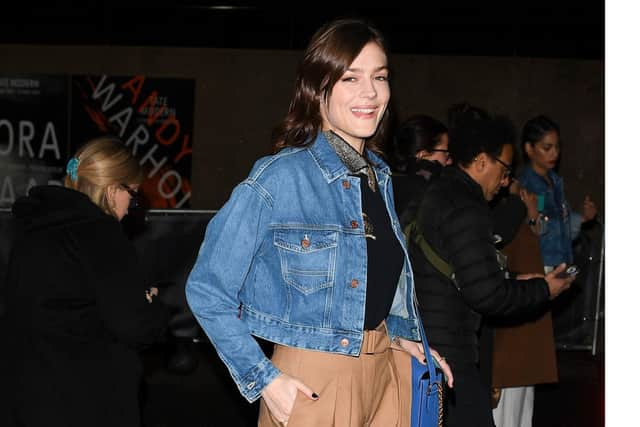

Anderson also found reading about the history of the period interesting, particularly the politics with regard to the spread of fascism and its sympathisers.
“I didn't know very much about the decade before the Second World War and didn’t realise that fascism was considered to be quite an interesting subject by a lot of the English aristocracy. So I think while Diana is unusual in the sense of how extreme she is, she's also a product of her time and her environment and would have been moving in circles where actually, sadly, quite a lot of people would have probably shared her opinions and ideas.”
“I think that it is important to portray that because it reminds us where things can end up and how dangerous these ideas can be. If enough people think and say these things you end up with real world events where people die. It feels weirdly timely to have this season coming out now, when we live in a world where it's extreme, politically."
Research can only take you so far, and the world of Peaky is fictional and at times fantastic, so having done her homework, Anderson embraced the script and took a leap.
“I had read and read and tried to absorb as much of that energy as possible and then ultimately I just abandoned all that and went with the scripts. You have to be at liberty to take a certain amount of artistic license and know you're not making a factual documentary. You're turning someone into a character within a fictional world so you have to take that and run with it and also make it your own. In terms of physical stuff, the only thing they did was bleach my eyebrows so they would match the wig, but other than that it was pretty much all me really.”
Part of creating the fantasy world of the series is down to the costumes, the work of Scottish costume designer Alison McCosh, who set the mood with her interpretation of Thirties’ fashions that sees the sartorial slashers cutting a dash in style.
“She’s a real genius and I just loved everything she suggested, so that made it easy,” says Anderson.
Was there anything she wore on the series that she would like to have kept?
“Oh my god yeah. Alison had a couple of original Thirties pieces from auctions so there’s a really amazing silver dress that came from America. It weighed a tonne because it was made out of a silver thread and fitted me like a glove, which surprised me because most of the Thirties clothes I was way too tall for and they had to be altered. I’d have loved to have kept that, but sadly, it’s off in storage. Otherwise I really enjoyed the long, elegant over-the-elbow black evening gloves. But it’s rare that you get to keep costume because it’s archived.
So there are no Peaky costumes in the Anderson wardrobe alongside the “few nice bits” she’s acquired from modelling jobs, such as a Chanel bag and a Burberry poncho with her initials stitched into it, but she does have a prop from a forthcoming episode.
“It’s framed and in my bedroom now and it’s really cool. It’s in episode six so I can’t say what it is, apart from it’s a document.”
What Anderson can talk about, as it’s already screened, is the scene she found hardest to play in the series.
“The monologue of Diana talking about a meeting with Hitler and various others in Germany, and talking about the Jews. That was probably the heaviest day because the subject matter was unbelievably traumatic. As an actor when you’re going ‘Oh my God this is such a fun role to play’, of course you’re aware you’re saying things that are horrific. In the moment I separated myself from it, but that night I definitely had a heaviness and sense of ‘I need to really let this go’ because you can’t carry that stuff. It’s too much.
“Most of the other Diana scenes, although they’re very provocative, there’s a lightness to her, whereas that one, I had to go to that place of her darkness. It was also my first day on set, so I was like ‘thanks guys, scheduling that one!’ At the same time I was pleased when it was done and I knew that I wouldn't have to say those words ever again. But I think it’s good it’s in there, because that’s what people were saying and thinking, and it’s just horrific.”
Diana is a total departure from her role as Jane Fairfax in Emma, the film she made in the 2020 adaptation of the Jane Austen classic novel.
“Lovely sweet Jane. She’s talked about a lot and in a fair amount of the story but doesn’t say much because she’s trying not to give anything away. So it’s fun after you’ve done a relatively silent job to do one where there’s absolutely no filter whatsoever. Diana just says whatever she likes and doesn’t care about the consequences.”
While Anderson went with the script on Peaky, on her previous job, The Souvenir Part II with Honor Byrne Swinton (also an ex-Moray Steiner pupil although they didn’t know each other at school), her mother Tilda and Tom Burke, it was very much a case of improvisation under the directorship of Joanna Hogg.
“I really loved the idea of doing a job where it was completely improvised and you were given a set of guidelines, like ‘this is where you are, this is who you are, you do like this person, you don’t like that person’ and then they would just go. I didn’t go to drama school so I’ve never had a chance to do that, so I really liked getting to play. Joanna Hogg has a real idea of what she wants to happen in every scene, but there’s total freedom in terms of everything else and as long as we get to certain points she’s happy. I think the accidental stuff that happens in between often makes something really interesting to watch and I found it fun.”
Anderson had learnt to go with the flow when she landed the role in White Lie, a 2019 Canadian drama film just three weeks before the start of filming. Starring Kacey Rohl as a university student who fakes a cancer diagnosis, Anderson played her friend Jennifer.
“I learnt to trust my instincts on White Lie because I got the job really late and had literally a day between jobs before I flew to Canada. So it was extremely spontaneous and required me to just jump in and commit fully. I didn’t have time to do research or character development other than in my head. But actually I really enjoyed the experience of not over-thinking and planning too much and I think that that’s something I really carried from that job.
“As an actor it’s nice if every take is a little bit different. If you plan what you’re doing too much you lose the potential magic that just comes in the moment. Also I was very jet-lagged so I couldn’t overthink anything because I was just trying to keep myself awake! That lent itself to a sense of spontaneity and a looseness. White Lie was total fiction, modern day, why not just turn up and see what happens, see what other people are doing and just riff? It’s fun.”
Not only was it fun, but it won Anderson a Best Supporting Actress in a Canadian Film from the Vancouver Film Critics Circle. What does she think the judges saw in her performance?
“I have no idea,” she says. “I mean, God. I don’t know! But I was very, very happy to win. Sadly I didn’t get to go to any ceremony but I did get to record a little acceptance speech on my phone. I had just recovered from tonsillitis so somewhere out there there is a very croaky acceptance speech. I loved making that film so it was really nice for it to be recognised in any way.”
More fun looks to likely to be had in her next job, Jaclyn Bethany’s forthcoming feature film Tell That to the Winter Sea in which she co-stars with Greta Bellamacina. Set in an English country house, it’s a story of female friendship on the eve of a wedding.
“Similarly to White Lie, it’s a film that’s got an amazing script but there’s definitely room for improvisation. I’m obviously going to learn my lines but it’s very close to me as a character so there isn’t too much reaching outside of myself to do. It’s shooting over eight or nine days, which is really ambitious, so I’m literally going to live in the house in Kent where we’re filming and it’s going to be very immersive. I almost don’t want to do too much prep. I’m just going to go on holiday tomorrow and not think about work, then once I’m back start on it.
“I just want to turn up and see what happens. Which probably sounds very unprofessional really,” she laughs, “but there you go. It’ll be fun.”
Peaky Blinders series six airs on Sundays at 9pm on BBC One and BBC iPlayer.
